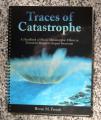
New Theory of the Earth
by Don L. Anderson
Publisher: Cambridge University Press 2007
ISBN/ASIN: 0521849594
ISBN-13: 9780521849593
Number of pages: 405
Description:
An interdisciplinary advanced textbook on the origin, composition, and evolution of the Earth's interior: geophysics, geochemistry, dynamics, convection, mineralogy, volcanism, energetics and thermal history. The book ties together all the strands of the subdisciplines. The new edition includes many new sections and dozens of new figures and tables. It is a stimulating textbook on advanced courses in geophysics, geochemistry, and planetary science, and supplementary textbook on a wide range of other advanced Earth science courses. It will also be an essential reference and resource for all researchers in the solid Earth sciences.
Download or read it online for free here:
Download link
(141MB, PDF)
Similar books
 Traces of Catastrophe
Traces of Catastropheby Bevan M French - Lunar and Planetary Institute
A detailed introduction to impact processes, crater formation, and shock metamorphism. The book is intended for geoscientists of all kinds: students, professors and professional geologists who may encounter an impact structure in the field area.
(13525 views)
 Technical Guide to Managing Ground Water Resources
Technical Guide to Managing Ground Water Resourcesby Steve Glasser, at al. - US Forest Service
The effects of human activities on ground water need to be clearly understood in order to manage these systems. This guide emphasizes that disruption of ground water resources has consequences for hydrological systems and related environment.
(17227 views)
 Why, and How, Should Geologists Use Compositional Data Analysis
Why, and How, Should Geologists Use Compositional Data Analysisby Ricardo A. Valls - Wikibooks
It is important for geologists to be aware that the usual multivariate statistical techniques are not applicable to constrained data. It's also important to have access to appropriate techniques as they become available. This is the aim of this book.
(11353 views)
 This Dynamic Earth: The Story of Plate Tectonics
This Dynamic Earth: The Story of Plate Tectonicsby W.J. Kious, J.W. Kious, R.I. Tilling - United States Government Printing
Introduction to the concept of plate tectonics for all readers interested in the subject, also the source of information for science teachers at the middle or high school level. Great graphics and photos matching a well written text.
(16179 views)